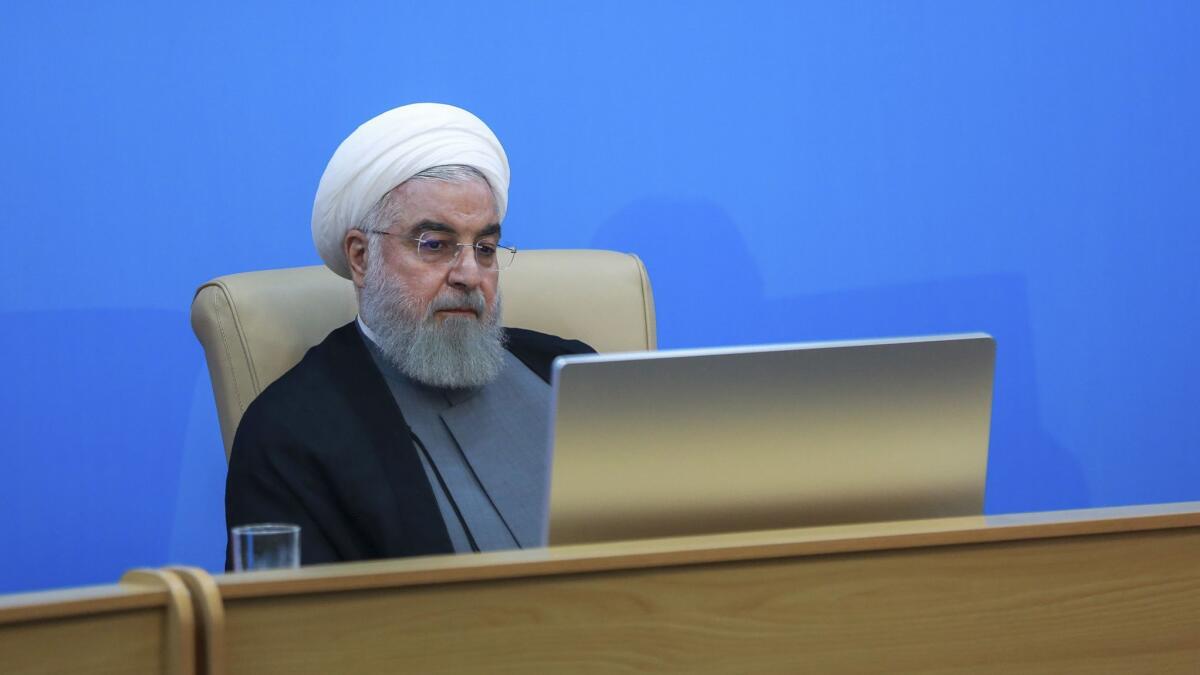Trump says Iran attacks will be met with ‘obliteration’; Tehran says it’s done with diplomacy

President Trump said Tuesday that an Iranian attack on any American interest will be met with “great and overwhelming force” and in some areas, “overwhelming will mean obliteration.”
Trump issued the threat in a tweet that came after Iranian President Hassan Rouhani said the White House is “afflicted by mental retardation.” Trump called that a “very ignorant and insulting statement.”
The latest verbal volleys between Tehran and Washington followed the U.S. decision on Monday to levy financial sanctions against Iran’s supreme leader and his associates.
Rouhani said in a televised address that the decision meant the “certain failure” of the White House pressure campaign against Iran. He went on to call the sanctions against Supreme Leader Ayatollah Ali Khamenei “outrageous and idiotic,” especially as the 80-year-old Shiite cleric has no plans ever to travel to the United States.
Trump said Iranian leaders spend their money on supporting militant groups and don’t care about the Iranian people who are suffering under economic sanctions.
Iran’s Foreign Ministry sharply criticized the new U.S. sanctions, saying the measures spell the “permanent closure” for diplomacy between the two nations. From Israel, U.S. national security advisor John Bolton said talks with the U.S. were still possible and that the Trump administration is leaving an “open door” for Iran to walk through.
But the comments from Tehran clearly showed its leaders think otherwise at a time of heightened tensions between Washington and Tehran over its nuclear program and Iran’s downing of a U.S. military surveillance drone last week.
“The fruitless sanctions on Iran’s leadership and the chief of Iranian diplomacy mean the permanent closure of the road of diplomacy with the frustrated U.S. administration,” said Abbas Mousavi, a Foreign Ministry spokesman, according to the state-run IRNA news agency.
The crisis gripping the Middle East is rooted in Trump withdrawing the U.S. a year ago from Iran’s 2015 nuclear deal and imposing crippling new sanctions on Tehran. Recently, Iran quadrupled its production of low-enriched uranium to be on pace to break one of the deal’s terms by next week while also threatening to raise enrichment closer to weapons-grade levels on July 7 — if Europe doesn’t offer a new deal.
Citing unspecified Iranian threats, the U.S. has sent an aircraft carrier to the Middle East and deployed additional troops alongside the tens of thousands already there. All this has raised fears that a miscalculation or further rise in tensions could push the U.S. and Iran into an open conflict, 40 years after the Islamic Revolution.
The latest sanctions follow Iran’s downing last week of a U.S. surveillance drone, worth more than $100 million, over the Strait of Hormuz, an attack that sharply escalated the crisis in the Persian Gulf. After the downing of the drone, Trump pulled back from the brink of retaliatory military strikes but continued his pressure campaign against Iran.
U.S. officials also said they plan sanctions against Iranian Foreign Minister Mohammad Javad Zarif, something that drew Rouhani’s anger during his televised address on Tuesday.
“You sanction the foreign minister simultaneously with a request for talks,” an exasperated Rouhani said and called the sanctions “outrageous and idiotic.”
“The White House is afflicted by mental retardation and does not know what to do,” Rouhani added.
There was no immediate reaction from Washington early on Tuesday to the remarks from Iran. The sharp comments are reminiscent of North Korea’s verbal attacks on Trump before the dramatic change in course and the start of negotiations with Washington. However, in Iran’s case, there are no signs Iranian leadership would welcome talks.
More to Read
Sign up for Essential California
The most important California stories and recommendations in your inbox every morning.
You may occasionally receive promotional content from the Los Angeles Times.










